25 June, 2009
14 June, 2009
Rudolf Kempe
 Rudolf Kempe: Master Conductor
Rudolf Kempe: Master ConductorA few days ago I picked up second-hand this bargain 2-CD set of Kempe, and the subtitle "Master Conductor" IMHO cannot be more befitting of this greatly neglected conductor.
Kempe was always the second-line conductor of EMI, one of those lesser known central-European super musicians who seemed to have found the UK congenial to their temperaments. Others like Jascha Horenstein and Klaus Tennstedt come readily to mind.
Kempe Biography(wikipedia)
Rudolf Kempe Society (Biography and more)


 EMI has surprisingly recorded quite a bit of Kempe but, aside from some operas (little rivalled Wagner for example), has shamefully not kept them in circulation. One indispensible set that is likely still available is the super-bargain set of the complete (or nearly so) Strauss orchestral works, with the resplendent Dresden Staatskapelle. Just this set is enough to immortalize Kempe's name. The performances are fully all top-drawer, and yield nothing to more famous recordings of Reiner or certain Karajan and Bohm. There is opulence, drama, as well as tight control in all these works, never once lapsing into vulgarity. e.g. I have never heard a better Also Sprach Zarathustra. EMI has several incarnations for this set. It is also now avilable on Brilliant Classics. For a glimpse into Kempe as accompanist, ther is the super-bargain Encore issue of Brahms Piano Concerto No. 2 with Bruno-Leonardo Gelber, one of the best versions ever. What about all the other great recordings? It is left to specialty labels to re-dress the problem.
EMI has surprisingly recorded quite a bit of Kempe but, aside from some operas (little rivalled Wagner for example), has shamefully not kept them in circulation. One indispensible set that is likely still available is the super-bargain set of the complete (or nearly so) Strauss orchestral works, with the resplendent Dresden Staatskapelle. Just this set is enough to immortalize Kempe's name. The performances are fully all top-drawer, and yield nothing to more famous recordings of Reiner or certain Karajan and Bohm. There is opulence, drama, as well as tight control in all these works, never once lapsing into vulgarity. e.g. I have never heard a better Also Sprach Zarathustra. EMI has several incarnations for this set. It is also now avilable on Brilliant Classics. For a glimpse into Kempe as accompanist, ther is the super-bargain Encore issue of Brahms Piano Concerto No. 2 with Bruno-Leonardo Gelber, one of the best versions ever. What about all the other great recordings? It is left to specialty labels to re-dress the problem.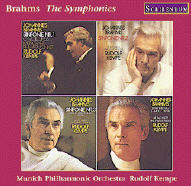
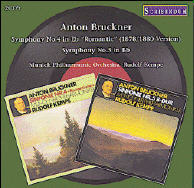 No Kempe fan would want to be without his magnificent Bruckner and Brahms. Scribendum has issued quite a few of these. The Brahms 4 Symphonies and Bruckner Symphonies 4 and 5 are all with the Munich PO. These again show Kempe's control of architecture and the way he patiently builds climaxes of considerable power. He is not a flashy conductor, but the more you listen to him the more you like the sound of the orchestra. Great attention paid to chording (like Karl Bohm's VPO Beethoven).
No Kempe fan would want to be without his magnificent Bruckner and Brahms. Scribendum has issued quite a few of these. The Brahms 4 Symphonies and Bruckner Symphonies 4 and 5 are all with the Munich PO. These again show Kempe's control of architecture and the way he patiently builds climaxes of considerable power. He is not a flashy conductor, but the more you listen to him the more you like the sound of the orchestra. Great attention paid to chording (like Karl Bohm's VPO Beethoven).
 Testament has issued quite a few of Kempe's recordings. Quite a few are available in the library and they are superb in musicianship as well as sound. One of the very best is a tightly controlled Scheherazade, with the RPO, thrilling down to the last bar. this is the same performance that is in the much cheaper Disky issue (oop) pictured at top. This performance joins Reiner at the very top. I also like very much hid Brahms 4 with the BBCSO on BBC Legends.
Testament has issued quite a few of Kempe's recordings. Quite a few are available in the library and they are superb in musicianship as well as sound. One of the very best is a tightly controlled Scheherazade, with the RPO, thrilling down to the last bar. this is the same performance that is in the much cheaper Disky issue (oop) pictured at top. This performance joins Reiner at the very top. I also like very much hid Brahms 4 with the BBCSO on BBC Legends.There are much much more. These are just some personal favorites. For a great discography:
Kempe Discography (Part I), Kempe Discography (Part II)
02 June, 2009
11 April, 2009
Dinu Lipatti
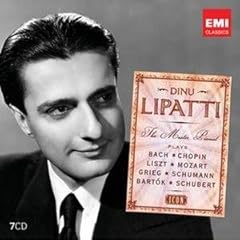 Dinu Lipatti
Dinu Lipattiwikipedia entry
The Roumanian pianist died young and all of his recordings are in mono, though some are in very good sound. This bargain 7-CD set is mandatory purchase for those who like pianism at its loftiest height but who do not mind sometimes compromised sound.
Almost all the content have been issued in single CDs, many deservedly in EMI's "Great Recordings of the Century".
One of my favorites here is the Mozart Piano Concerto No. 21. I recently picked up an EMI LP of this and inside is a note by the producer Walter Legge. Apparently, this 1950 recording was made for Swiss Radio. Listening to the incisive, all-encompassing playing, you'll never realize this was played by a literally dying man. This was the last concerto he played and at the recording session only the pianist's wife, Artur Schnabel, Elizabeth Schwarzkopf (Legge's wife) and Legge were among the audience. Due to Swiss union rules, the tape was destroyed after broadcast and it took Legge/EMI 7 years to find an amateur recorded copy. Although the sound is not good, Lipatti's playing virtually leapt at you; and Karajan got incredibly expressive playing out of the Lucerne Festival Orchestra. This is now my favorite version.
But my favorite Lipatti is the Bach Jesus, Joy of man's Desirings (from Cantata 147; youtube clip embedded below). I have never heard these played better and this is my all time favorite piano Bach (eclipsing Glenn Gould, yes). No one has come close.
Lipatti plays a Chopin Nocturne.
More Chopin
Alban Berg Quartet

 The mighty Alban Berg Quartet
The mighty Alban Berg QuartetThe Alban Berg Quartet disbanded soon after the death of their last violist, Thomas Kakusa, but not before visiting HK. Those who were present shall remember the perfectionism they had even if they might not have warmed to their somewhat icy interpretations.
I have followed this quartet since they first burst on the international scene. I have at least half of their early recordings on TELEFUNKEN LPs with fantatstic covers of the string instruments. The LPs now are worth some money. These recordings are now issued in a bargain TELDEC box that is almost mandatory purchase to string quartet lovers.
Some say the early ABQ have a warmer tone. I am not so sure. In a revealing system, the ABQ on Teldec and EMI sound very very similar. I recently compared their Haydn Op 76 quartets on both Teldec and EMI and found little difference in interpretation or tonal splendor. The reason for comments like this may have as much to do with the difference between analogue recordings and digital ones.
The TELDEC box contains the Haydn Op 76, Mozart "Haydn" quartets, some Dvorak, Berg, Schubert etc. All were immaculately played and most emotionally more generous than in their later EMI recordings.

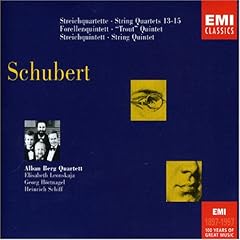 The ABQ made integral recordings of Mozart and Beethoven for EMI, and they are available in bargain boxes. Some of the readings are rather mannered here, and the recordings are not always as fine as in the Teldec issues. Nonetheless, they are desirable.
The ABQ made integral recordings of Mozart and Beethoven for EMI, and they are available in bargain boxes. Some of the readings are rather mannered here, and the recordings are not always as fine as in the Teldec issues. Nonetheless, they are desirable.The ABQ recxorded a large number of composers (like the excellent Wolfgang Rihm), and many CDs are sadly oop. For me, the best place to start with the EMI ABQ would be in the bargain Gemini issue of the most important piano quintets, played by 4 pianists, all with the ABQ.
For those more adventurous. Their Bartok series is worth explosring. With minimal duplication, I'd also recommend their Schubert box.
But the TELDEC box is the place to start.
01 April, 2009
Glenn Gould
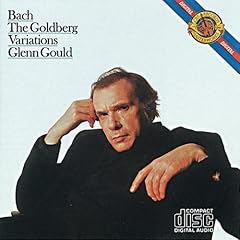
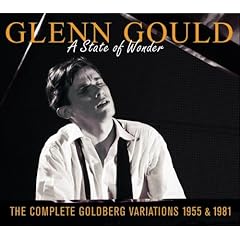 Glenn Gould
Glenn GouldGoldberg Variations
I do not need to tell anyone about Glenn Gould. His Bach Goldberg Variations are legendary and almost every classical listener has a copy of either his mono or stereo version. You can easily compare now that they have issued both in a convenient set (right pic). There is little question that Gould probes the MUSIC a lot deeper in the stereo remake, which is the one I prefer (original cover in left pic). Gould has recorded almost all of Bach's keyboard music, all in his inimitable fashion, but none to me reaches the profundity of the stereo Goldberg.
Do you really need Gould's Beethoven and Mozart sonatas? IMHO not really. For his idiosyncracies, they are as much pain as joy to listen to!
As an eccentric, Gould took pleasure in trashing classics and promoting little known music. Hence, he was a formidable exponent of little known piano literature. Berg, Hindemeth, Gibbons, Sibelius, etc. Aside from Bach, these are the composers Gould played the best.
 To me, there is one composer that Gould plays without peer, and surprise, he's Brahms! This is really little known. Many years ago, when I bought a copy of his Brahms Intermezzi I was astounded by the delicate sentiments Gould brought to these pieces, and I played the LP (original cover shown) many times in one go. To me these miniatures are Gould's finest achievements. He later recorded digitally the Ballades and all the Brahms are grouped together in various releases. However, these miniatures are the ones you should really listen to. Gould as romantic? You bet! I am not a great fan of Brahms' piano music, but THIS performance is supreme; I have not heard anything that can replace it. Desert island selection.
To me, there is one composer that Gould plays without peer, and surprise, he's Brahms! This is really little known. Many years ago, when I bought a copy of his Brahms Intermezzi I was astounded by the delicate sentiments Gould brought to these pieces, and I played the LP (original cover shown) many times in one go. To me these miniatures are Gould's finest achievements. He later recorded digitally the Ballades and all the Brahms are grouped together in various releases. However, these miniatures are the ones you should really listen to. Gould as romantic? You bet! I am not a great fan of Brahms' piano music, but THIS performance is supreme; I have not heard anything that can replace it. Desert island selection.After playing the immem clip above, if you like to hear more intermezzi,
click here
05 January, 2009
Mark Elder
 Mark Elder
Mark ElderEver since I heard the enigmatic Conductor Mark Elder live with the HKPO (review here), I have become a die-hard fan and read everything I could find on the internet about him. The quintessential English gentleman with a patrician manner and a "Masterpiece Theater" voice, Elder has an understated charm in person and on record you can hear him recite poems (splendidly) relevant to the music works and play the piano beautifully in an Elgar song! His interviews on the net make an excellent read; I particularly like the one where he talks about his London house. Apparently, the Halle did the complete Shostakovich cycle and he had a real liking to the composer. No wonder his concert in HK was so accomplished. You can read about his feelings about Shostakovich.
But it's his superb musicianship that's the focus here.


 Mark Elder on Record
Mark Elder on RecordI have not really listened to too many Elder CDs, which covers a hugh range. A good idea can be had on the cduniverse site. Elder is really not a household name, not even in the UK. Hoi said to me after his concert: "How come is not as famous as Simon Rattle?" Good question, I'd love to know the answer. From this discography you can see he is an experienced opera conductor and many records have him in supporting role.
It is with the Halle Orchestra's own CD label that you shall find Elder in greatest substance. Those not familiar with the Halle Orchstra should note that it was the orchestra of none other than the great John Babirolli, and if you like English music you likely know them.
I find the cover art of the CDs to prefectly reflect Mark Elder's style: Under-stated, clean, in-control, but with a sunstantial, colorful element. It is my fortune that some of these CDs, hard to find in HK, are available from the library! Over the holidays I listened to 4 of them and came away with heightened admiration for the man, and the orchestra.
I am a big Elgar fan and Elder is a noted Elgar specialist (they share the same birthday) and the 3 Elgar CDs I heard were all wonderful in content, performance and, most importantly, in superlative sound. Elder's Elgar is not overtly "emotional", nor "sensuous", but it is structurally sound and revealing of a myriad of fine emotions, all patiently built-up. For me this means the second symphony is the greater achievement. But the greatest surprise was the Enigma Variations, a work I never really dug. I have to say Elder's version finally conveyed the emotion behind each episode, and I like his version even more than those by Babirolli and Monteux, and that's remarkable! The discs also contain interesting small works as well as very very exciting accounts of the masterpieces In the South and Cockaigne Overture. Finally, there is an excellent account of the Nielsen 5th. Throughout, the playing of the Halle is first-class.
There are a few amazing things that should be noted. First, the sound Elder gets from the Halle is not that different from what he got from the HKPO! It is a very clean sound with a feeling of a very silent background, or shall we say repose and concentration? With lesser conductors, you always feel an impatient edge, some kind of nervousness extraneous to the music, not with Elder. And the way he builds a crescendo is just the way it should be, patiently, a moment-by-moment increase that conveys power and grandeur. Lesser conductors' crescendoes sound impatient, a sort of "premature ejaculation", or at least "much ado about nothing" (you can guess one of the conductors I am referring to here). Elder's recordings has the power of making me go back and see if I get more out of it a second time, and I did.
Subscribe to:
Comments (Atom)
